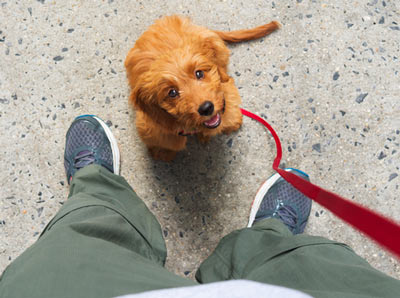Puppy Behavior Tips

When you have a puppy, you want to do everything you can to set the stage for a great life, happy times, and good behavior. Here, we give your our best general tips for teaching a puppy how to behave.
Don't Underestimate the Power of Puppy Socialization
Proper socialization might be the best thing you can do to ensure that your puppy develops good habits and to avoid common behavior problems.
Between the ages of 4 and 14 weeks of age, puppies' brains are best prepared for being socialized to new people and other animals. Socialization helps teach puppies appropriate ways of acting around other dogs, cats, and humans.
Simply having your puppy around lots of people and other animals in as many different situations as you can helps develop good socialization.
The tricky part is that the majority of this wonderful socialization time falls before a puppy is fully vaccinated. Check with your veterinarian to determine whether it's safe to have your puppy around other dogs.
Puppy Classes Are for You as Well as Your Puppy
Puppy classes are a great way to provide socialization for your puppy and an introduction to basic commands. But beyond that, these classes are great for teaching you how to train your puppy.
Puppy training isn't something that you do once in a class and then you're done, but rather it's something that you continue to reinforce with your dog throughout his life. Puppy classes teach you the proper techniques to use to train your dog.
Nip Problem Behavior in the Bud Early
It's common for people to ignore certain behavior problems in puppies because they are cute. For instance, a tiny puppy who jumps up on your leg, nips at your fingers, or pulls at your clothing can be kind of adorable. However, as the puppy gets bigger, these behaviors aren't as endearing.
You need to think ahead about how you want your puppy to act when he is an adult and insist on the behavior from the beginning. It will be much more difficult for you to solve behavior problems once you have allowed or even encouraged them for a period of time than if you divert them from the beginning.
Be Open to Your Veterinarian's Opinion
Veterinarians are trained in behavior, and they also have the benefit of experience from dealing with thousands of dogs over time. He or she may spot a potential behavior problem in your puppy that you aren't aware of.
If your veterinarian brings up a concern to you, accept it with an open mind and don't take it as criticism. Your veterinarian is simply trying to help you avert a bigger problem in the future when your dog is older and bigger. He or she can also refer you to a veterinary behaviorist if the concerning issue is serious, such as if he is showing early signs of aggression.
You May Also Like These Articles:
How to Stop Your Dog from Jumping on People
You Have E-Mail; Your Dog Has P-Mail
Dr. Google: Helpful or Dangerous?
Slug and Snail Bait Poisoning in Dogs
Retractable Dog Leashes: Know the Risks
How to Teach a Dog to Play Dead
Disclaimer: This website is not intended to replace professional consultation, diagnosis, or treatment by a licensed veterinarian. If you require any veterinary related advice, contact your veterinarian promptly. Information at DogHealth.com is exclusively of a general reference nature. Do not disregard veterinary advice or delay treatment as a result of accessing information at this site. Just Answer is an external service not affiliated with DogHealth.com.
Notice: Ask-a-Vet is an affiliated service for those who wish to speak with a veterinary professional about their pet's specific condition. Initially, a bot will ask questions to determine the general nature of your concern. Then, you will be transferred to a human. There is a charge for the service if you choose to connect to a veterinarian. Ask-a-Vet is not manned by the staff or owners of DogHealth.com, and the advice given should not delay or replace a visit to your veterinarian.



